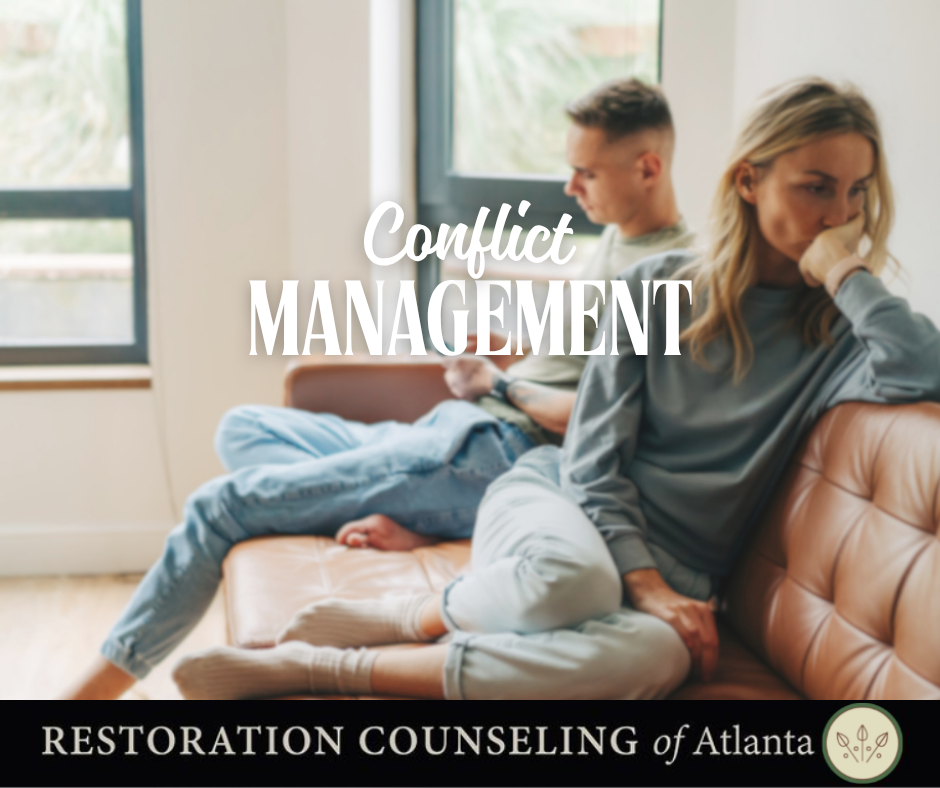THE INNER WORK OF CONFLICT
We are relational beings, created for connection. Naturally, relational conflicts arise all around us – especially within close relationships such as those with parents, siblings, spouses or significant others, friends, and co-workers. Disagreements and friction may appear inevitable, but how they are handled often determines the health and longevity of relationships. Therefore, it is essential to develop healthy and constructive ways of managing conflict.
HOW DID WE DEVELOP A BLUEPRINT TO HANDLE CONFLICT?
We all experience conflict differently, and much of our understanding of how to handle it is shaped by what we observed growing up. For many, the first lessons about conflict resolution come from our family of origin. Some may have seen their parents avoid addressing issues altogether, leading to withdrawal and unresolved tension. Others may have witnessed direct but hostile confrontations, where conflict ended without true resolution or repair. Some people might believe they never saw any relational conflict at all, perhaps because their parents chose to argue behind closed doors. Finally, there are those who were fortunate enough to grow up in families where conflict was handled in a healthy way: with open communication, emotional safety, and genuine repair of the relationship.
HOW CAN WE MAKE SENSE OF HOW WE REACT TO CONFLICT?
Our reactions to conflict are shaped not only by how it was modeled during our upbringing but also by our deeper emotional needs, current emotional state, cultural background, and past experiences. Here are a few examples:
-
Avoidance
-
- Description: Ignoring the conflict, withdrawing, or pretending it doesn’t exist.
- Underlying emotions and motives: Fear of confrontation, desire to keep peace, avoiding shame or anxiety, or belief that the issue isn’t worth addressing.
- How it shows up: Walking away, changing the subject, or being quiet.
- What it can lead to: Unresolved problems, unspoken tension, repression of one’s feelings, and resentment.
-
Aggression
-
- Description: Responding with anger, blame, criticizing another’s character or personality, trying to “win” the argument.
- Underlying emotions and motives: Feeling threatened, trying to regain control, feeling unheard or unseen.
- How it shows up: Yelling, passive-aggressive behaviors, or being defensive.
- What it can lead to: Increased tension, loss of respect, breakdown of trust, trauma, and psychological damage.
-
Accommodation
-
- Description: Yielding to the other person’s demands, often at one’s own expense.
- Underlying emotions and motives: Avoid escalation, trying to “keep the peace,” or low self-esteem.
- How it shows up: Giving in to the other person, saying “you’re right” even though they disagree.
- What it can lead to: Dishonesty, resentment, loss of trust.
Having a deeper understanding of our responses through self-awareness and reflection can enable more open communication, provide a solid foundation during times of tension, and foster healthier relationships. To make sense of our reactions, we can ask ourselves, ‘Why did I react that way?‘ ‘What was I feeling in the moment?’ ‘What am I trying to protect?’
HOW TO MANAGE CONFLICT IN A HEALTHY WAY?
Managing conflict starts with understanding yourself and what you bring to the table. Be mindful that each of us has our own background, experiences, and emotional “baggage” (which includes unresolved hurts). This can lower the risk of projecting past pain onto present interactions.
Equally important is being mindful of how another person receives what we’re communicating. We all process and respond differently based on our own histories and personalities. Compassion and curiosity about the other person’s perspective can soften conflict and build bridges of understanding.
Practicing active listening is foundational. It means more than just listening to the other person. It includes giving full attention, reflecting on what is heard, and resisting the urge to interrupt or defend. When we create a space where everyone feels heard, respected, and valued, we allow ourselves to be more vulnerable and take down our guards to have a much more meaningful conversation.
Healthy conflict management relies on compromise and collaboration. This involves working together to find a solution that either satisfies both parties fully or finds a middle ground. When both (or all) parties are motivated by a genuine desire to seek what’s best for one another and operate with mutual respect, even difficult conversations can be overcome and lead to stronger connections.
Additionally, embracing healthy communication skills is key. Dr. Gottman, a renowned American psychologist and relationship researcher, identifies four destructive communication patterns (called the Four Horsemen) along with corresponding, healthy alternatives (The Gottman Institute, 2024):
- Criticism (verbally attacking personality or character) →
Gentle Start-Up: Begin conversations with “I” statements that express your feelings and needs without blame. - Contempt (attacking one’s sense of self with intent to insult) →
Build a Culture of Appreciation: Focus on the other’ positive qualities and regularly express gratitude. - Defensiveness (playing the victim or shifting blame) →
Take Responsibility: Acknowledge your role in the conflict, validate another’s feelings, and offer a sincere apology. - Stonewalling (withdrawing to avoid conflict or express disapproval) →
Physiological Self-Soothing: Take a break to calm down and return to the conversation with a clearer mind.
WHY IS REPAIR AND RESTORATION SO CRUCIAL?
Conflicts and relational ruptures do not have to lead to broken relationships. As Dr. Curt Thompson (Thompson & Sweeney, 2025) reminds us, while we live in a world that would like us to believe that there should not be any ruptures, such is not the case. He encourages us to learn to recognize that ruptures happen as a normal part of life’s rhythms. Repairing conflicts is the doorway to healing. It fosters forgiveness and acknowledgement of hurt, releasing resentment, and reconciling different perspectives. Through this process, we can cultivate emotional maturity, rebuild trust, and restore emotional connection and security.
Repair and restoration are also a reflection of God’s story of redemption. We see this as God Himself offers us the ability to repair our relationship with Him. The Father sent His Son for this very purpose, for us to ask for forgiveness for our wrongdoings so that we can restore our relationship with Him.
“Let all bitterness and wrath and anger and clamor and slander be put away from you, along with all malice. Be kind to one another, tenderhearted, forgiving one another, as God in Christ forgave you” (Ephesians 4:31-32).
“Finally, all of you, have unity of mind, sympathy, brotherly love, a tender heart, and a humble mind. Do not repay evil for evil or reviling for reviling, but on the contrary, bless, for to this you were called, that you may obtain a blessing” (1 Peter 3:8-9).
References:
The Gottman Institute. (2024, November 22). The Four horsemen: The antidotes. https://www.gottman.com/blog/the-four-horsemen-the-antidotes/
Thompson, C. & Sweeney, P. (Hosts). (2025, February 19). Being Known Podcast [Audio podcast]. https://thebeingknownpodcast.podbean.com/e/the-foundation-of-resilience-how-small-disruptions-build-stronger-connections/
 Written By: Christella Hedrich
Written By: Christella Hedrich
christella@restorationcounselingatl.com
Christella (Roswell) is a graduate student intern who offers a therapeutic space that is safe, considerate, and hopeful. Her goal is to allow clients to unravel and make sense of their stories and gain deeper understanding of themselves. She is driven in her work with diverse individuals facing challenges such as anxiety, depression, trauma, family of origin issues, interpersonal and relationship dynamics, cross-cultural matters, and life transitions or difficulties (career change, parenthood, infertility, perinatal care, etc.). Christella uses insights from evidence-based research and always finds assurance in the truth of God’s word to bring healing and restoration. Learn more about our interns & their lower-cost counseling services HERE!

